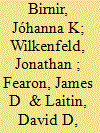|
|
|
Sort Order |
|
|
|
Items / Page
|
|
|
|
|
|
|
| Srl | Item |
| 1 |
ID:
137031


|
|
Socially relevant ethnic groups, ethnic structure, and AMAR
/ Birnir, Jóhanna K; Wilkenfeld, Jonathan ; Fearon, James D ; Laitin, David D, Gurr, Ted Robert, Brancati, Dawn Saideman, Stephen M, Pate, Amy, Hultquist, Agatha S
|

|
|
|
|
| Summary/Abstract |
Protracted conflicts over the status and demands of ethnic and religious groups have caused more instability and loss of human life than any other type of local, regional, and international conflict since the end of World War II. Yet we still have accumulated little in the way of accepted knowledge about the ethnic landscape of the world. In part this is due to empirical reliance on the limited data in the Minorities at Risk (MAR) project, whose selection biases are well known. In this article we tackle the construction of a list of ‘socially relevant’ ethnic groups meeting newly justified criteria in a dataset we call AMAR (A for All). We find that one of the principal difficulties in constructing the list is determining the appropriate level of aggregation for groups. To address this issue, we enumerate subgroups of the commonly recognized groups meeting our criteria so that scholars can use the subgroup list as one reference in the construction of the list of ethnic groups most appropriate for their study. Our conclusion outlines future work on the data using this expanded dataset on ethnic groups.
|
|
|
|
|
|
|
|
|
|
|
|
|
|
|
|
| 2 |
ID:
158993


|
|
|
|
|
| Summary/Abstract |
Why do some insurgent groups with associated electoral parties target civilians despite the costs of doing so? Organizations with peaceful electoral wings and violent factions operating at the same time are common in contemporary democracies. One of the more consistent observations in the literature is that insurgent targeting of civilians is costly to their electoral counterpart, and insurgents are aware of this cost. Yet, many insurgent groups continue to target civilians. In this article, we suggest a localized effect of violence on electoral outcomes of parties with ties to violent groups offers an explanation for why such insurgent groups might continue to perpetrate violence. Specifically, we suggest insurgent benefits, measured as electoral costs to the incumbent for failure in stemming the violence, likely outweigh the localized electoral costs to insurgent-affiliated parties from the violence. Our subnational analysis of violence and electoral results across Peruvian provinces strongly supports our story.
|
|
|
|
|
|
|
|
|
|
|
|
|
|
|
|
|
|
|
|
|